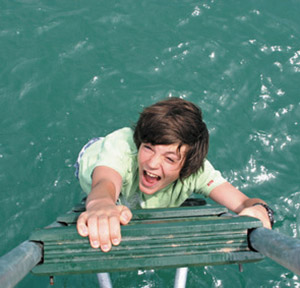

Welcome to Summer! With the advent of summer camps, the kids are bursting with anticipation for the diverse recreational opportunities that camps offer—a major one being swimming, water-based activities, and other events that revolve around an environment of water. Many kids crave the water instructional and sports programs, and look forward to them with great anticipation. In this region of the country, this craving is amplified by the relatively limited window of seasonal time available for outdoor water activities. We have the swift interlude of summer—a few short months with long warm days. And then—the fleeting opportunity disappears, almost as fast as it came.
But there is a small minority of kids—as well as adults—who shudder at the thought of going to a pool or near a lake. Minority that they are, their fear of the water is much more than a minor issue for them. Some are terrified to enter a pool area or go near a lake or the ocean. This real terror is never minor, and for these kids and adults, just the thought can send their pulse into overdrive and make them break into a sweat. Most of them will do just about anything else in order to avoid even a remote possibility that they will have to get near—or heaven forbid, into—the water. To these people this terror is very real, very major and—especially in the case of adults and older children—often substantiated by a terrifying previous experience. Wearing a life-jacket in a paddle boat in three feet of water is not safe enough for them.
When someone you know discloses their fear of water, it is important to validate their fear or at least not minimize or demean the terror they feel. Often, well-meaning family and friends will make off-handed, uninvited and demeaning remarks about this type of fear. Frequent insensitive remarks include: “Oh, that’s easy to fix…why don’t you just take swimming lessons?” or “Did your old Uncle Schmendrik strike fear in your heart about how you could drown in a teaspoon of water?” Saying that is worse than saying nothing. Better: simply acknowledge the comment with understanding and support.
Worse: consider this frightful story told by a friend about a supposedly “credentialed” water safety instructor in a summer camp program. The instructor goaded this child that she should jump from the low diving board and swim to the side of the pool. This skill was part of the regular swim instruction program, and had supposedly been mastered by most of the children. Although the child pleaded she was not ready and could not swim well enough and was afraid to try, the instructor coaxed her to the end of the diving board—and then pushed her into the water! The child did manage—amidst her spluttering, flailing and sobbing with fear and humiliation—to somehow get herself to the side. But the result was demoralizing and left an enduring imprint of fear and paralysis that had extensive and long-term consequences in other areas of her life. One of those consequences evolved into the continual undercurrent of building trepidation during the week prior to every single visit she made to the mikvah, and tortured her for 20 long years—until she successfully completed a specialized program for adults who are afraid of the water. Not swimming lessons.
Imagine the impact of this situation on her private family life: a mitzvah normally approached with spirituality and joy, cruelly converted instead into a regular occurrence of anxiety and fear. This situation is also a challenge for the wonderful women who are mikvah attendants. Kindness, patience and understanding go a very long way; yet they do not truly address the core issue of fear. And so it has been for the fearful older child or young adult heading off to camp, with fear of the water on their mind, awaited by a well-meaning—but often unprepared—water instruction program. While there might be a few exceptional cases, the average camp and swim instruction programs do not include specialized instruction for fearful older children.
Very often we will hear someone say, “I can’t swim.” However, active listening joined with a careful look at the speaker’s facial expression might reveal the possibly deeper meaning of, “I am afraid.” Many people equate these two concepts. Sometimes even the people who say them also equate them. Although the issues certainly have points of intersection with each other, they are distinctly different issues, and require very different responses to meaningfully and appropriately address the core issue.
By Ellie Wolf













